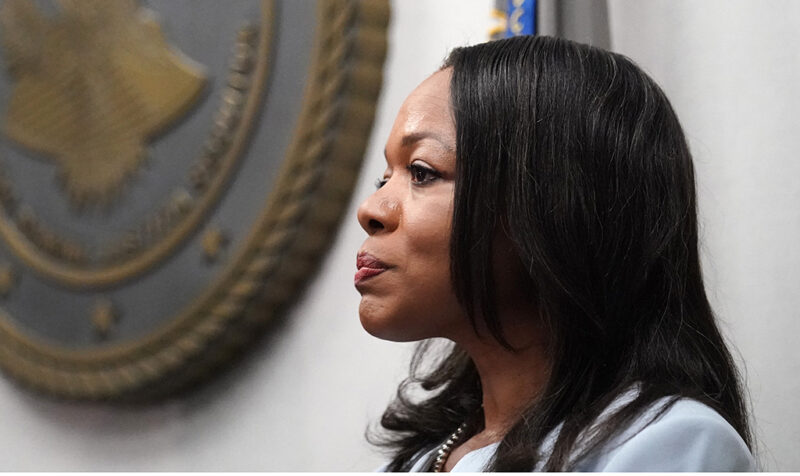Jim Mustian and Jake Bleiberg fittingly beat the competition with news of the biggest impact yet from their two-year investigation of beatings and cover-ups by the Louisiana State Police: The U.S. Justice Department is opening a sweeping civil rights probe of the agency to see if there is a pattern of excessive force and racial discrimination.
Based on their deep sourcing, Mustian and Bleiberg were able to exclusively report the federal “pattern-or-practice” investigation as a news alert about an hour before the official announcement in Baton Rouge. It marked the first such action against a statewide law enforcement agency in more than two decades.

Assistant Attorney General Kristen Clarke speaks at a news conference in Baton Rouge, La., June 9, 2022, announcing a federal “pattern or practice” probe into the Louisiana State Police.
AP Photo / Gerald Herbert
And while Assistant Attorney General Kristen Clarke said the “significant” justification to open the probe came from “publicly available information,” all the examples she cited came from a string of AP scoops that exposed (often with video) beatings of mostly Black men and the Louisiana agency’s instinct to protect troopers rather than investigate them.
Mustian, an investigative reporter based in New York, launched AP’s initial coverage by looking specifically into the secretive 2019 arrest of Black motorist Ronald Greene. Troopers at first said Greene’s death was caused by a car crash at the end of a high-speed chase. But Mustian was able to obtain long-buried body-camera video that showed what really happened: white troopers stunning, punching and dragging Greene as he pleaded for mercy.

In photo at left, Louisiana State Police Trooper Kory York stands over Ronald Greene, lying on his stomach, outside of Monroe, La., during a fatal arrest, in a May 10, 2019 image from Lt. John Clary’s body-camera video. Videos of the incident, obtained by the AP, show Louisiana state troopers stunning, punching and dragging the Black man as he apologizes for leading them on a high-speed chase. At right, former Louisiana State Police Detective Albert Paxton, center, stands with Mona Hardin on May 10, 2022, as mourners light candles at the site of Greene’s arrest three years earlier.
Louisiana State Police via AP (left); AP Photo / Jake Bleiberg
Mustian then teamed up with Dallas-based law enforcement reporter Bleiberg to find that Greene’s arrest was among at least a dozen cases over the past decade in which state police troopers or their bosses ignored or concealed evidence of beatings, deflected blame and impeded efforts to root out misconduct. Dozens of current and former troopers said the beatings were countenanced by a culture of impunity, nepotism and, in some cases, outright racism.
AP’s reporting found Louisiana troopers have made a habit of turning off body cameras during pursuits and often justified beatings by falsely claiming suspects resisted. When footage is recorded, the agency has routinely refused to release it. And by its own tally, 67% of state police use of force in recent years was against Black people, who make up 33% of the state’s population.
There could be more fallout. Lengthy federal and state criminal probes are ongoing, looking not only at troopers but whether top brass obstructed justice to protect them. And AP scoops about what Louisiana’s governor knew and when he knew it have drawn further scrutiny. After Mustian and Bleiberg’s exclusive reported last month that Democratic Gov. John Bel Edwards watched a key body-camera video of Greene’s death six months before prosecutors even knew the footage existed, a state legislative panel looking into the case took the highly unusual step of calling the governor himself to testify, which could happen later this month.
AP’s ownership of the Greene story and its aftermath was reflected in strong play for the latest scoop on the federal probe. The piece ranked No. 3 on apnews.com, behind only previews of the prime-time hearings into the Jan. 6 Capitol riot. Other media credited AP’s role in spurring the probe, including The New York Times and Washington Post; MSNBC’s Yamiche Alcindor cited “a really big AP investigation.”
